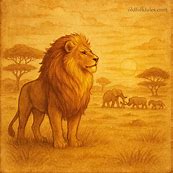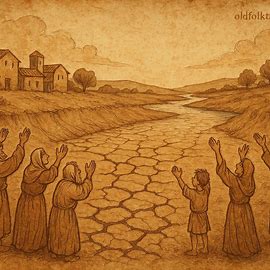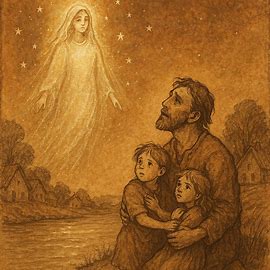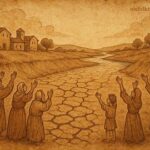In a small Zulu village surrounded by rolling green hills, there lived a boy named Lindo whose laughter was as wild as the wind itself. He was known across the land for his boundless curiosity and for chasing anything that moved, butterflies, drifting clouds, and even dust devils that swirled through the dry fields. His grandmother often warned him, “Lindo, the wind listens when you call it. Be careful what you ask of it.” But Lindo only laughed. He loved the way the breeze danced through his hair and carried his laughter across the plains.
One bright morning, while Lindo was playing by the riverbank, a strange stillness fell over the land. The air stopped moving, and not even the leaves trembled. Then, from behind a large rock, a cool gust swept past him and formed into a shape, a swirling figure of air and light. The figure spoke softly, like a whisper carried from the mountains. “You call to me every day, little one,” it said. “I am the Wind Spirit, keeper of the skies. Will you be my friend?”
Don’t miss out: Read more Southern African folktales
Lindo’s eyes widened. “You can talk!” he exclaimed. “I’ve always wanted to fly like you, to go anywhere, to be free.”
The Wind Spirit shimmered, laughing like the rustle of leaves. “Then come with me, Lindo. Let me show you the world.”
Before he could blink, the wind lifted him high into the sky. They soared over valleys, rivers, and herds of wildebeest that dotted the plains. Lindo’s heart raced with joy. He shouted with excitement as they swept past the mountaintops where eagles circled, through clouds that smelled of rain, and down to the ocean where waves crashed like drums of thunder.
Days turned into nights and back into days again. The Wind Spirit took him everywhere, showing him the world from above. “See how everything moves in harmony,” the spirit said. “The rivers flow, the trees bend, and the wind carries life across the land. Freedom is beautiful, but even the wind must know when to rest.”
Lindo nodded but did not truly understand. When he returned home, he felt the earth beneath his feet as something slow and heavy. “Why must I walk when I can fly?” he murmured. Each day, he called upon the Wind Spirit again. Together they raced through the sky, faster and wilder each time.
Soon, the Wind Spirit began to lose control. The skies darkened, and the air turned fierce. Torn branches flew through the air. The thatched roofs of the village trembled. The people ran for shelter, shouting, “Lindo, stop! The wind will destroy us!” But Lindo, laughing in the storm, could not hear them. He felt powerful, unstoppable.
Then, with one final roar, the Wind Spirit’s voice turned sorrowful. “You have forgotten balance, Lindo. Freedom without care brings chaos.” With that, the wind threw him gently to the ground beside his grandmother’s hut and disappeared.
The village was in ruins. Roofs were gone, crops lay flattened, and frightened animals ran loose. Lindo’s laughter faded as he saw what had happened. Tears filled his eyes. His grandmother placed a trembling hand on his shoulder. “The wind gives life, my child, but it can also take. True freedom is not doing whatever you wish, but knowing when to stop.”
Lindo spent many days helping rebuild the village. He planted new crops, gathered lost animals, and repaired roofs. Though the Wind Spirit no longer appeared, he could still feel the breeze brushing his cheek whenever he worked with care. One night, as he looked up at the stars, a soft voice drifted through the air. “You have learned well, little one. When the wind listens, it carries wisdom.”
From that day on, Lindo became known as the boy who spoke to the wind, not to command it, but to understand it. And whenever the breeze passed gently through the village, the people would smile, remembering that even the strongest forces in nature must be guided by respect and love.
Moral Lesson:
True freedom comes with responsibility. The wind teaches us that power and liberty must be balanced with care and respect for others.
Knowledge Check
Who was Lindo, and what made him unique?
Lindo was a curious Zulu boy who loved chasing the wind and longed for freedom.What did Lindo’s grandmother warn him about?
She warned him that the wind listens when called and must be treated with respect.Who did Lindo meet by the riverbank?
He met the Wind Spirit, who became his friend and guide.What lesson did the Wind Spirit try to teach Lindo?
That freedom is beautiful, but it must be balanced with responsibility and harmony.What happened when Lindo misused his gift?
The wind grew wild and destroyed his village, teaching him the consequences of carelessness.What did Lindo learn by the end of the story?
He learned that true freedom comes from understanding limits and caring for others.
Source:
Zulu folktale, South Africa. Collected by Vusamazulu Credo Mutwa in Zulu Shaman: Dreams, Prophecies and Mysteries(1996).






